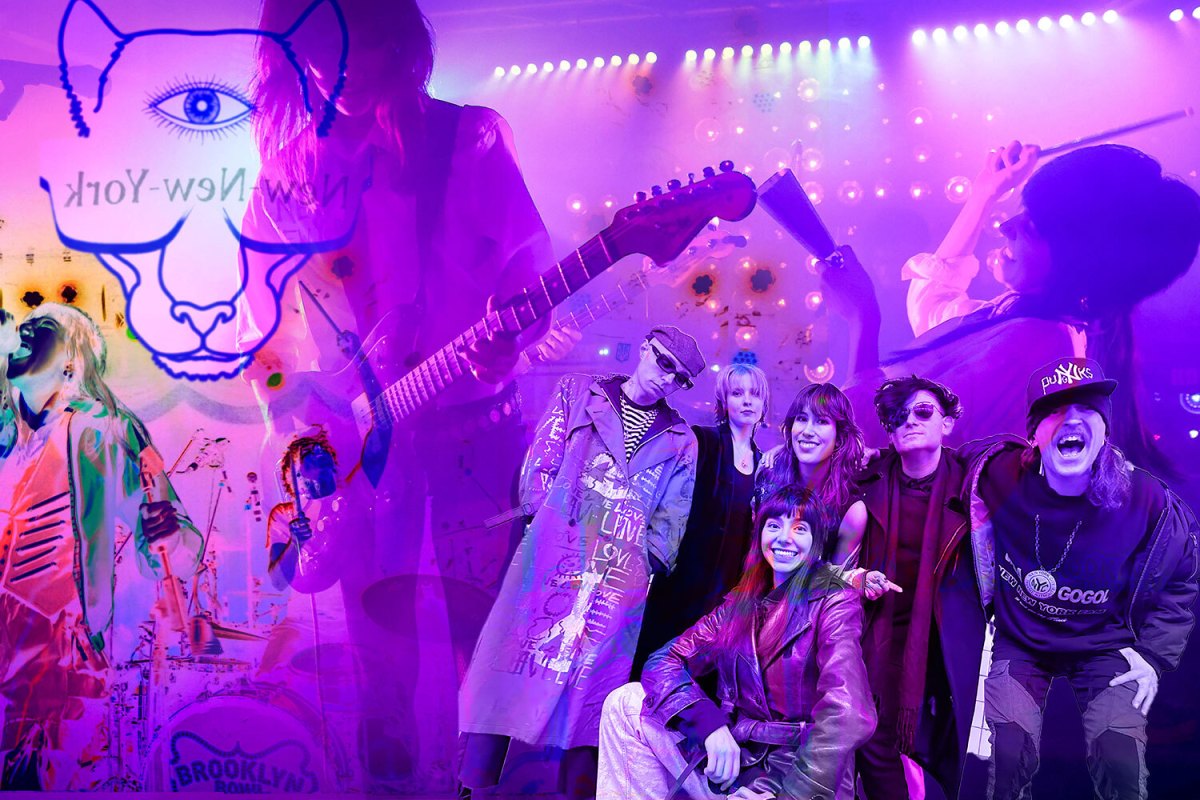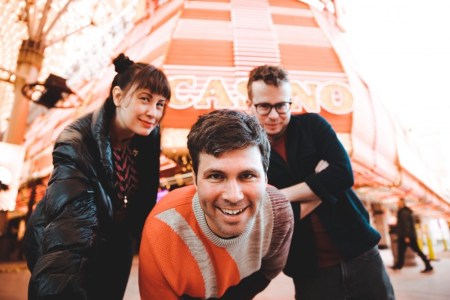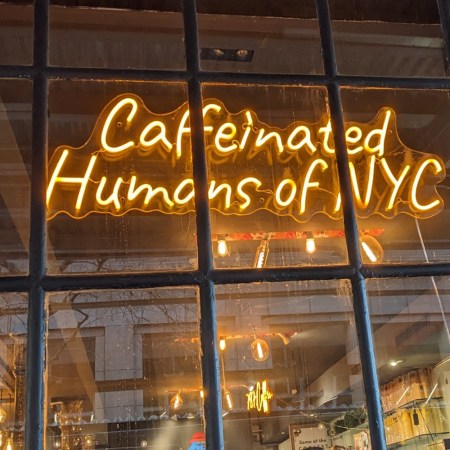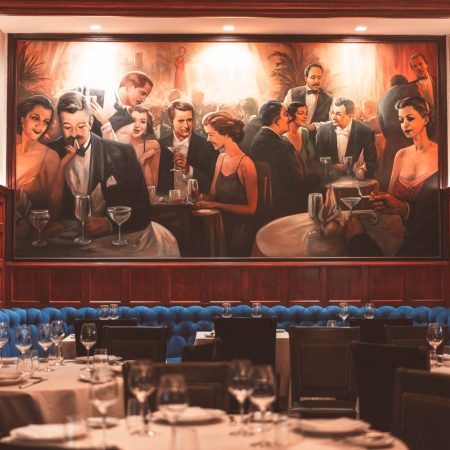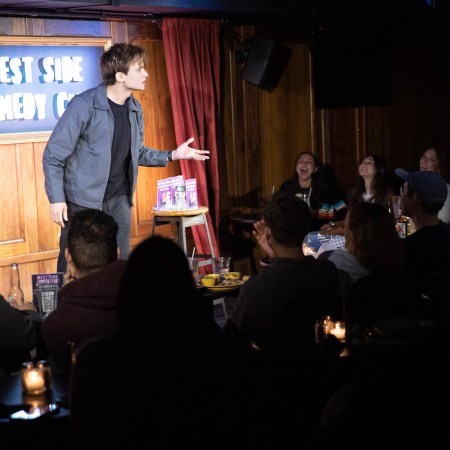Onstage in front of the Brooklyn-iconic wall of lights at Baby’s All Right in Williamsburg, 27-year-old singer Victoria Espinoza and her songwriting partner, guitarist Kay Bontempo, who’s 26, bounce, shimmy, sway and fist-pump to their amiably aggressive tunes. Under a disco ball, members of the packed crowd on this winter Wednesday night do the same, some with more youthful vigor and ease than others. Espinoza and Bontempo’s band, Puzzled Panther, isn’t just for “the kids,” a fact reflected not only in their multi-demographic audience, but also the remainder of the group’s lineup behind the young ladies. They’re three men whose musical résumés run decades deep. On bass, there’s Alex Ryaboy, an established composer and audio engineer; Brian Chase, of Yeah Yeah Yeahs fame, bangs the drums, and the group’s second guitar player is Eugene Hütz, frontman of gypsy rockers Gogol Bordello. These relatively elder statesmen all prove well-equipped to match Espinoza and Bontempo’s energy, however, compelled by a can’t-be-faked enthusiasm for the twosome’s tracks, which seamlessly fuse punk, pop, dance, grunge and blues rock. Their support of the pair makes more than a lick of sense. In addition to other historic New York City musical acts, the women’s songs are influenced by artists with whom their Puzzled Panther bandmates have all collaborated, making the group a primary flag-bearer of what Hütz calls the “New New York Sound.”
“It’s a naturally occurring phenomenon,” Hütz says of the category. Think: Talking Heads and Sonic Youth, for starters, meets The Strokes, Interpol, TV on the Radio and other bands that came out of the famed post-punk revival scene in early-aughts New York — but with a contemporary twist. “Victoria and Kay from Puzzled Panther are just discovering this music, and Brian Chase and I were part of it,” Hütz says. “So we’re meeting in the middle. There’s a cool spark in that. We’re dancing around the same fire.”
But this flame is turning into an inferno, and Hütz is collecting fuel sources. He recently founded Casa Gogol Records, launching the label in November 2023 with a single featuring Gogol Bordello and Bernard Sumner of New Order. Proceeds from the release were funneled toward resistance efforts in Hütz’s native Ukraine. However, Hütz tells me that Casa Gogol Records operates as more of a “platform” to promote artists in ways that go beyond music recording and distribution. He organizes performances for them and DJ sets featuring their music; he’s even put the greenest of these acts on tours opening for Gogol Bordello.
His motivations appear to run deeper than financial sustainability for his label. Hütz says he observed a dearth of musician community in his adopted city of New York, after post-punk revival groups graduated from playing local clubs to booking arenas all over the world. The COVID-19 pandemic also cut into any significant in-person networking possibilities for emerging artists and grizzled scene vets alike.
“I felt like, ‘What the fuck? Maybe it’s my time just to step up,’” Hütz says.
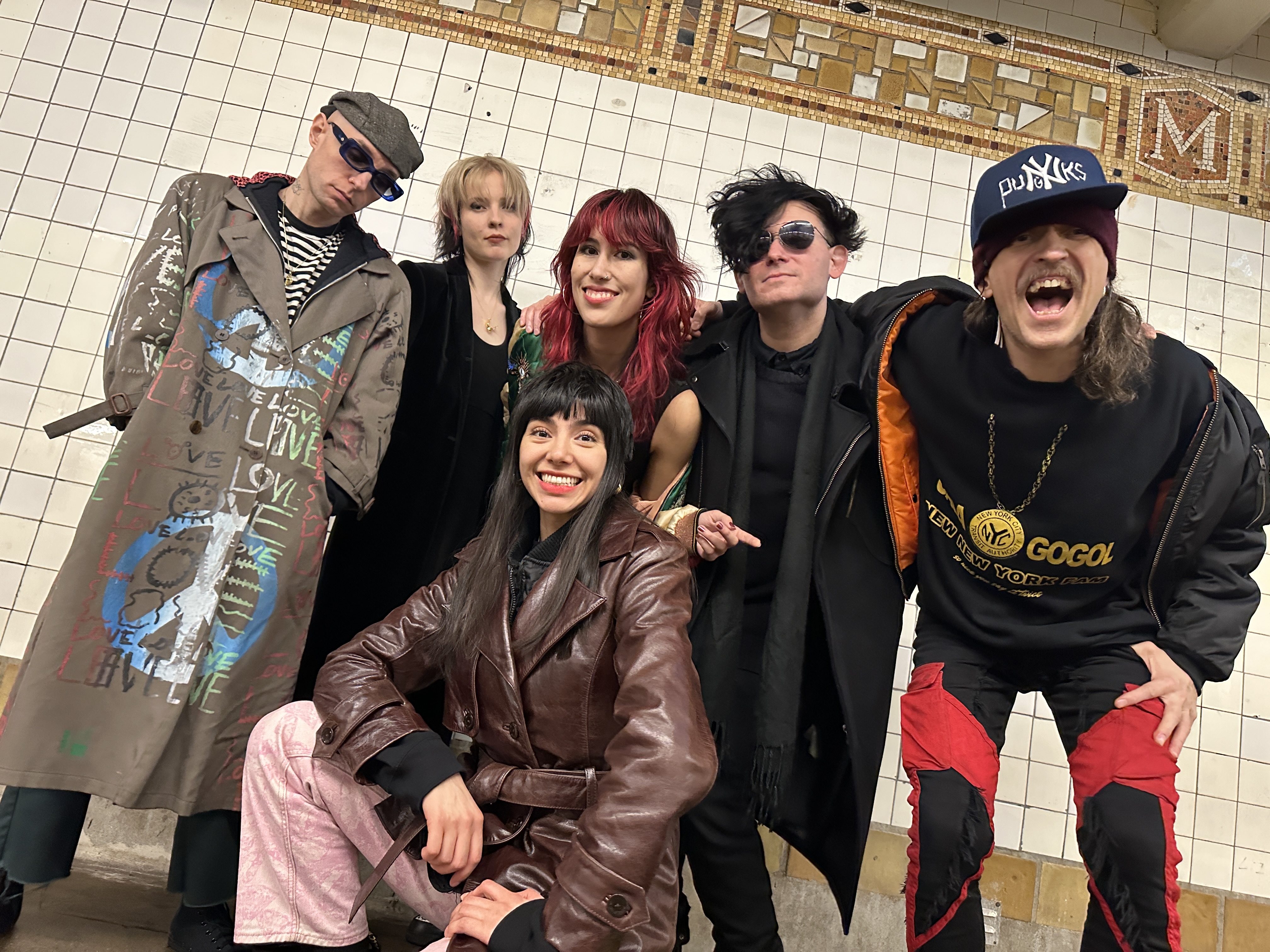
Over the past couple years he’s made it his mission to tribalize local musical artists. One of the more consequential connections he helped forge, though, occurred without this witting intention behind it.
Espinoza, who grew up in Portland, Oregon, moved to New York in 2019 with aspirational visions of musicianship. A fan of Gogol Bordello, she met and befriended Hütz shortly after she settled into the city, and eventually played him her songs. In 2022, she attended a screening of a documentary about Hütz’s band. Bontempo, another Gogol Bordello fan, was also there, all by herself. They struck up a conversation and instantly bonded over shared musical interests, which along with aforementioned acts also includes The Ramones and James Chance and the Contortions. Espinoza counts PJ Harvey as a non-New York influence, while Bontempo name-drops Soundgarden.
Hütz encouraged a partnership between Espinoza and Bontempo, never more than when he coaxed them onto a brief Gogol Bordello tour of Western states just a few months after they began transcribing songs.
“We met our rhythm section for that mini-tour an hour before we went on stage,” says Bontempo, referring to the drummer and bass player from Crazy and the Brains, another band in the “Casa Gogol family,” which Hütz often calls the collective. “They learned our shit from demos,” Bontempo continues, “and we just went on and did it. It was the most spontaneous thing I’ve ever done, but it was great.”
Hütz, Chase, and Ryaboy, who’s produced past Gogol Bordello records, joined Puzzled Panther a little while later. In spite of significant age gaps between the males and females of the group, their chemistry wasn’t perhaps so unlikely. Both Espinoza and Bontempo, as well as Hütz, subscribe to the idea that young people today are more apt than their generational predecessors to consume and embrace music released before their birth. With the advent of streaming technology, access to music from any era (or genre) has never been easier. It takes as few clicks to hear Taylor Swift as it does Nirvana, so what’s old is perpetually new — and served on a digital platter.
But, Espinoza points out, streaming music consumers are “at the mercy of the algorithm,” and it’s still important to go to bars and talk to people in a given area so that they may learn about even more artists.
Technology has played another role in the formation of this growing community, as it allowed recently formed bands and newer individual acts to generate and fine-tune their respective artistic visions during the pandemic. “People got introspective,” Hütz says of the COVID era. “It kind of was a [period] for some poets to really give a voice to their intuition.” And when it came to composing the soundtracks that would run behind their voices, many of them had to rely on synthesizers — a convenient musical tool for people stuck at home and, thus, an instrument Hütz says is “essential” to the sound that’s going underground-viral across the Five Boroughs.
As social distancing rules move deeper into New Yorkers’ memories, these musicians, starved for interpersonal interaction, are now finding each other.
“There’s a desperation for a new New York scene,” says Leah Hennessey, a singer/songwriter from Manhattan, who’s not directly associated with Casa Gogol Records, but knows of the platform’s artists. “It’s starting to coalesce.”
She says something that would help the community-building cause are more venues that regularly book local acts. That’s not a small ask, unfortunately, given the high cost of commercial real estate in the city — though a down market could provide opportunities to forward-thinking nightlife entrepreneurs.
When I describe the Hütz-defined New New York Sound to Hennessey, she says its musical touchstones are apparent in her listenings of these fellow up-and-coming artists. She also slides them into a potential alternate camp: the “indie-sleaze revival,” which Dazed recently covered.
“Often thought of as the last true IRL subculture, existing before the full force of social media, indie sleaze/bloghouse was characterised as spontaneous, hedonistic and horny, reflected in an equally chaotic and in-your-face soundtrack,” Emily Sandstrom wrote for the publication in February. “The look was distinctly unrefined [with] ripped American Apparel tights, intentionally mismatched outfits, messed-up eyeliner, and skinny jeans galore, all captured by invasive flash photography. Hyperactive and escapist tracks from artists like the Yeah Yeah Yeahs and Crystal Castles have now become cult anthems for today’s disaffected urbanites.”
“No Stakes and No Ambition”: The Story of Cheekface, Indie Rock’s New DIY Heroes
How the trio became icons for a generation of nerd-rockersSandstrom points to a solo artist whose stage name is The Dare as one of the more popular acts embodying indie sleaze. His single “Girls” made waves through the clubs last year, per Sandstrom’s piece, with its “provocative and playful lyrics,” including the song’s opening lines: “I like the girls who do drugs / Girls with cigarettes in the back of the club / Girls that hate cops and buy guns.”
Some of Hennessey’s music arguably falls into this category, too. “Let’s Pretend (It’s the 80s),” released in 2020 with a band that bore her last name, is a charmingly wry track about reliving nights out that the parents of Gen Zers enjoyed during a time when their knees never hurt. “Let’s act like we’ve got money to blow / Take a cab to SoHo / Photographed by Maripol,” Hennessey echoes fashionably.
Once an opener for Gogol Bordello, cumgirl8 is another band, consisting of all women, that’s arguably a callback to indie sleaze’s heyday, with a heavily synthesized, “psychedelic” sound, as V Magazine described it in 2022. The group’s members bonded through songwriting as a means of expressing frustration over toxic relationships and the patriarchy, among other issues. Their song “Cherry Nipples” sounds like the middle of a Venn diagram consisting of Los Angeles hardcore punk rockers X and English goth innovators Bauhaus being run through the most recent version of Pro Tools.
But snark and synths aren’t necessarily front-and-center in all the offerings from musicians more closely orbiting Hütz.
Grace Bergere, another singer/songwriter and New York native, employs an acoustic guitar to drive her songs forward. She also counts PJ Harvey as a guide, as well as Elliott Smith and Tom Waits. Hütz, whose Casa Gogol Records is responsible for Bergere’s upcoming release, says her songs are “hypnotic in a Mazzy Star kind of way.” Still, considering her influences and others, she’s a “singular” talent in his mind — her work also “beautiful” and “elegant,” he says.
Bergere would rather her tracks not be defined as “dark” because, she says, it makes her “think of people whose aesthetics override their message.” But her songs’ tonalities and lyrics do conspicuously drift in that direction. “Every day I lose a little blood,” goes the opening line of her track “A Little Blood.” “Watch it running down my arms to stain whatever I’ve been wearing / So that later when you see it you will know / That it isn’t getting better, and if I say it is I’m lying.” She approves of the adjective “ethereal,” though, as well as “folksy” and, regarding her lyrics, “melancholic.”
Crazy & the Brains often sounds like a throwback guitar-based punk band, but frontman and longtime scenester from New Jersey Christoph Jesus makes sure the instrumentation is inclusive. The group earned press in Vice nearly a decade ago due in part to its penchant for compelling a party atmosphere at shows, with catchy tunes and the assistance of a xylophone. (See: “Ice Cream.”) But more recent songs penned by Jesus reveal a growing maturity, not unlike what we’ve witnessed from Arctic Monkeys across the last two-thirds of that band’s career. (See: the more atmospheric “Hold Me Close.”) Crazy’s most popular Spotify track, “Punk Rocker,” sounds like Johnny Rotten of the Sex Pistols and an acoustic guitar making love underneath a microphone.
Then, there’s Mary Shelley, a frenetic foursome who loves Sonic Youth and doesn’t object when, after taking in a performance of theirs that was typically heavy on theatrics, I invoke Meat Loaf comparisons. Hütz also describes them as a callback to Devo, while Mary Shelley member Sam Pinson categorizes the band’s music as “punk rock you can dance to.” Their raucous track “Bourgeois De Ville” is the perfect portal for new listeners, as it provides audio evidence of Mary Shelley’s stage antics, which, to name another legacy New York artist, are also reminiscent of Jon Spencer.
All of these performers, among others, are recharging the city’s music scene. They’re also resharpening their social skills, post-pandemic.
“Everybody’s super supportive and positive,” says Jackson Dockery of Mary Shelley, referring to artists in the burgeoning community. “Everybody’s sharing lists of labels, contacts, ways to submit to playlists. It’s really not competitive. I feel like it has been in the past.”
Christoph Jesus from Crazy & the Brains says he began performing in the area as the post-punk revival scene fizzled. Back then, he says, there “wasn’t necessarily anything super tangible to grasp onto,” in terms of community, but that’s changed. He’s noticed a “resurgence” of the “type of vibe” that flourished during the post-punk revival, and adds: “There’s something about the energy right now that is really exciting.”
“I have been hearing about scenes like this my whole life, from people who were around in the ’70s and ’80s, the ’90s,” Grace Bergere, the singer/songwriter, says. “I’ve been feeling bitter and jealous that I didn’t even get to be near a scene like this, and now Eugene [Hütz] has swooped in and decided to start something, and I’m so grateful because I think it’s the beginning of a new scene for music in New York. We’ve really been lacking one. All of a sudden there are all these bands that I actually want to go see, which is really saying something.”
She should be seeing plenty of labelmates Puzzled Panther — perhaps as soon as Friday, April 12 when the band plays a gig at Heaven Can Wait on Avenue A in Manhattan. Puzzled Panther’s debut EP also just arrived April 2, featuring the single “Smoke and the Mirrors We Broke,” an anthemic jaunt showing off all corners of the band’s eclectic sound, one that’s already proven appealing to music lovers young(ish) and old(ish), part of a bubbling scene that is primed to write the next chapter in New York City music history.
“Not to continue to harp on this pandemic string, but…people forgot what it was like to go out on a certain night of the week and just rage hard,” says Espinoza.
With their help we might be starting to remember.
This article was featured in the InsideHook newsletter. Sign up now.
